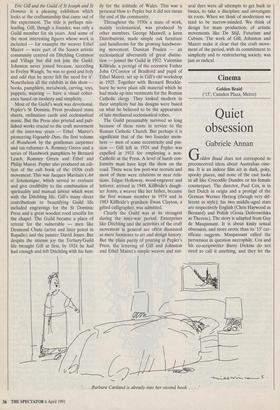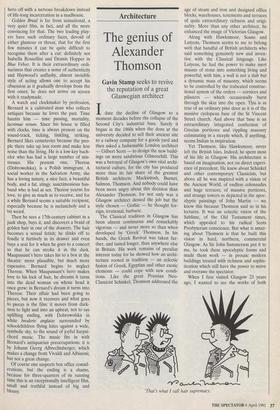Cinema
Golden Braid
(`15', Camden Plaza, Metro)
Quiet obsession
Gabriele Annan
Golden Braid does not correspond to preconceived ideas about Australian cine- ma. It is an indoor film set in dark, poky, spooky places, and none of the cast looks at all like Crocodile Dundee or his female counterpart. The director, Paul Cox, is in fact Dutch in origin and a protégé of the German Werner Herzog (though very dif- ferent in style); his two middle-aged stars are respectively English (Chris Haywood as Bernard) and Polish (Gosia Dobrowolska as Therese). The story is adapted from Guy de Maupassant. It is about kinky sexual obsession, and more erotic than its '15' cer- tificate suggests. Maupassant called the perversion in question necrophily. Cox and his co-scriptwriter Barry Dickins do not need to call it anything, and they let the
. Barbara Cartland is already into her second book . . . . hero off with a nervous breakdown instead of life-long incarceration in a madhouse.
Golden Braid is far from sensational, a very quiet film, in fact, and all the more convincing for that. The two leading play- ers have such ordinary faces, devoid of either glamour or threat, that for the first few minutes it can be quite difficult to recognise them after a cut: definitely not Isabella Rossellini and Dennis Hopper in Blue Velvet. It is their extraordinary ordi- nariness that creates a sense of authenticity and Haywood's unflashy, almost invisible style of acting allows one to accept his obsession as it gradually develops from the first onset; he does not arrive on screen with it readymade.
A watch and clockmaker by profession, Bernard is a cultivated man who collects antiques because he loves the past. Time haunts him — time passing, mortality, lacrimae rerum. Since his house is filled with clocks, time is always present on the sound-track, ticking, tinkling, striking. Bernard likes cemeteries because the peo- ple there take up less room and make less noise than the living. He is a low-key bach- elor who has had a large number of mis- tresses. His present one, Therese (Dobrowolska), is a Polish immigrant. A social worker in the Salvation Army, she has a loving nature, a nice face, a beautiful body, and a fat, stingy, sanctimonious hus- band who is bad at sex. Therese yearns for love, to give as much as to receive, and for a while Bernard seems a suitable recipient, especially because he is melancholy and a bit weird.
Then he sees a 17th-century cabinet in a junk shop, buys it, and discovers a braid of golden hair in one of the drawers. The hair becomes a sexual fetish; he slinks off to fondle it furtively in its drawer and even buys a seat for it when he goes to a concert SO that he can stroke it in the dark. Maupassant's hero takes his to a box at the theatre: more plausible, but much more expensive. Bernard begins to neglect Therese. When Maupassant's hero makes love to his lock of hair, he dreams it turns into the dead woman on whose head it once grew; in Bernard's dream it turns into Therese. Their affair had been going to pieces, but now it recovers and what goes to pieces is the film: it moves from dark- ness to light and into an upbeat, not to say uplifting ending, with Dobrowolska in white broderie anglaise surrounded by schoolchildren flying kites against a wide, symbolic sky, to the sound of joyful harpsi- chord music. The music fits in with Bernard's antiquarian preoccupations: it is by Johann Georg Albrechtsberger, which makes a change from Vivaldi and Albinoni; but not a great change.
Of course one suspects box office consid- erations, but the ending is a shame, because for three-quarters of its running time this is an exceptionally intelligent film, small and truthful instead of big and blousy.



















































 Previous page
Previous page